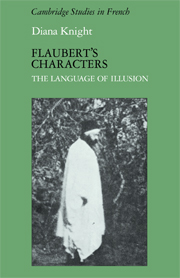Introduction: Character and value
Published online by Cambridge University Press: 25 October 2011
Summary
Any study of a past writer is likely to be marked by the critic's own interests, and certainly by his theoretical presuppositions as to the essential areas of interest. Yet strangely, in the case of Flaubert, two contradictory critical approaches, representing opposed attitudes to literature itself, arrive at somewhat similar conclusions. On the one hand, contemporary French sensitivity to Flaubert's modernity leads to an insistence upon the lack of a stable meaning; on the other, a whole Anglo-Saxon tradition finds his novels severely wanting in human interest and moral complexity. Evaluation of Flaubert's status as a major writer is clearly at stake for both sides: the modern critic finds his attention to language and to the formal possibilities of the novel exemplary, while the Leavisite seeker of an appeal to the adult mind cannot honestly appreciate his work at all. The latter is unable to account for the merit which he nevertheless half recognizes in Flaubert; the former, if asked to explain the long-held belief that Flaubert was not just a manic stylist, but equally a representational writer with a world-view to communicate, would doubtless relegate that belief to the realm of ideological prejudice and inferior, naive reading.
The influential view of Flaubert as not only elusive ironist but also supreme dismantler of all stable values and transcendental fixed presences, probably reached its high point at the 1974 Cerisy colloquium on the production of meaning in Flaubert (Gothot-Mersch, 1975).
- Type
- Chapter
- Information
- Flaubert's CharactersThe Language of Illusion, pp. 1 - 6Publisher: Cambridge University PressPrint publication year: 1985

